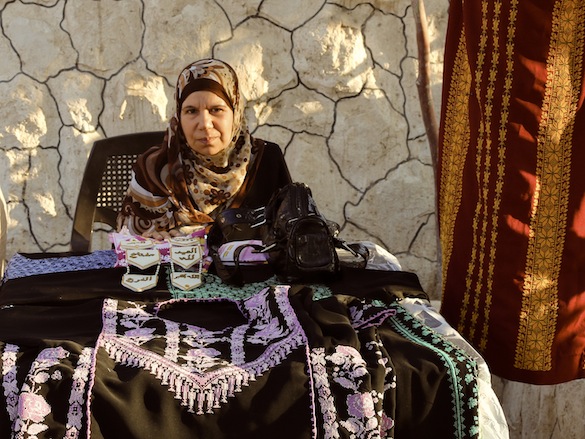Zarqa, Jordan – Ten years ago Salwa’s husband disappeared. They didn’t have children, so she has been waiting and living alone ever since. With no pension, social aid, or help from relatives, at 54-years old, Salwa has had to provide for herself working as a tailor from home. She saw few prospects for her future until she heard about the Enhancing Economic Resilience for Displaced Iraqis and Poor Jordanians project sponsored by the Near East Foundation (NEF) in Zarqa, and found help from people who didn’t consider her too old to invest in her business.
With a grant from NEF, Salwa bought a new sewing machine, learned valuable marketing and business skills, expanded her business, and found new clients through bazaars and other outreach events. Salwa and other poor Jordanian and Iraqi women like her rarely have the chance to participate in street-markets and bazaars because mobility restrictions imposed by families, safety risks, and gender-based threats of violence prevent them from having an independent social life and economic opportunities outside the home. The follow-up phase of the NEF project is a crucial step toward ensuring that women who receive grants are actually able to launch a sustainable business, apply the skills they learned in the training sessions to manage their economic resources, and gain increased rights in their households and communities.
On Bazaar Day, Salwa is the first to arrive, and with meticulous care, prepares her assigned stall for the day ahead. She proudly displays the beautiful dresses she made and embroidered with traditional designs, then waits for the other vendors and clients to arrive. Salwa’s self-confidence in selling her merchandise is in stark contrast to her demeanor during the business development training where she appeared shy.
Now that she has joined a women’s business network established by NEF and regularly attends meetings to share experiences, information, and challenges with women like her, she has found continued support in a safe social environment. Most importantly, Salwa now feels less alone.
The EER initiative is helping over 700 Iraqi refugees and Jordanians to establish more secure and safe livelihoods through business and vocational training, financing, and support networks. The range of businesses includes hairdressing, cooking, art production, computer maintenance, smartphone repair, and business marketing services, among others. Building social and business linkages is an important part of the project.
More photos from the bazaar can be found here.
This project is financed by the United States Department of State’s Bureau of Population, Refugees and Migration.



